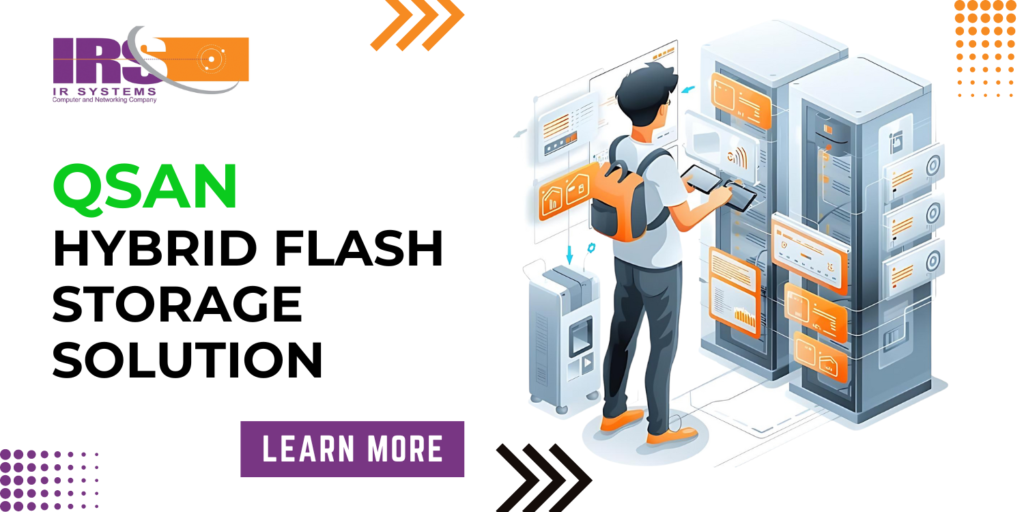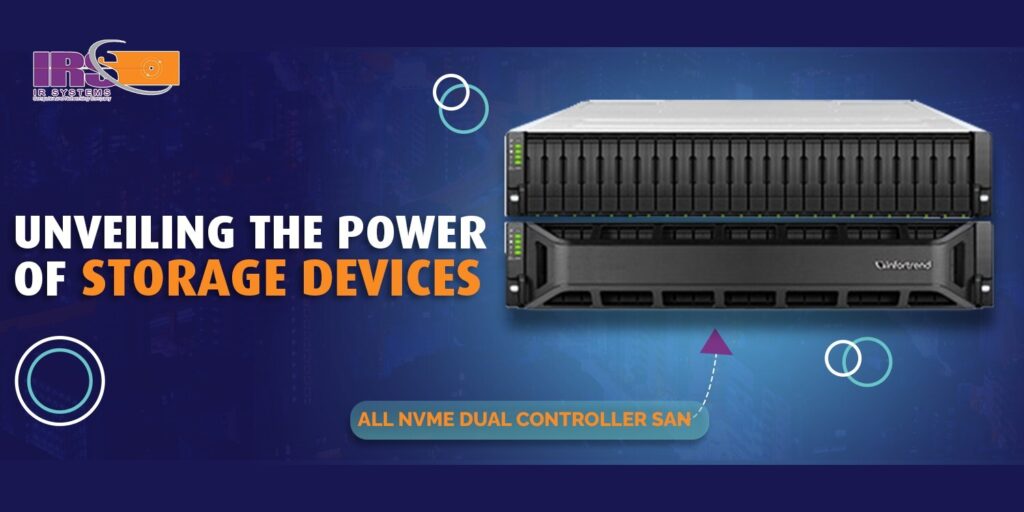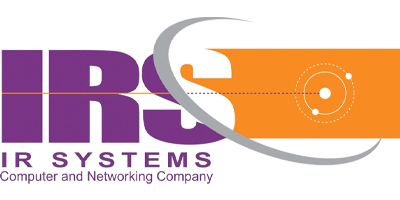Advanced Backup Solutions – Enhance Data Security with NAS

In today’s fast-paced digital world, data storage is crucial, and reliable backup solutions are more essential than ever. Backup storage solutions, like Network Attached Storage , play a pivotal role in ensuring the safety and accessibility of your data, whether for personal or business needs. A robust backup data storage protects against unexpected data loss from cyber threats, accidental deletions, or hardware failures, giving you peace of mind. Here’s what you need to know about the key types of backup storage solutions and why Network Attached Storage (NAS) is a popular choice for modern data management. Why Backup Storage Solutions are Essential Data loss can be devastating, especially when it involves sensitive or irreplaceable information. Backup storage solutions provide the safety net that every individual and organization needs to protect critical data. Here are a few of the main benefits: Protection Against Cyber Threats: With increasing cyber threats, a secure backup ensures data can be recovered if compromised. Preventing Data Loss from Hardware Failures: Hardware malfunctions can result in lost files; a reliable backup can help restore these without hassle. Access to Historical Data: Sometimes, having old versions of files or documents is necessary. Backup solutions retain versions for future access. Exploring Network Attached Storage (NAS) Network Attached Storage is becoming increasingly popular among local businesses and individuals. NAS offers a centralized platform to store, share, and back up data. Unlike traditional hard drives, NAS devices connect to your network, allowing multiple users to access files from different devices simultaneously. This storage solution is ideal for those looking for a streamlined way to manage and protect data. Top Advantages of Network Attached Storage (NAS) for Your Business Easy Accessibility: NAS allows users to access data from anywhere with an internet connection, making it an ideal solution for remote or hybrid workplaces. Data Security: Many NAS systems come with built-in security features, such as encryption and user authentication, to keep files safe. Scalability: NAS storage solutions are often scalable, allowing businesses to expand storage capacity as needed without overhauling the system. Types of Backup Storage Solutions A variety of backup storage solutions are available, each suited to different needs. Here are some of the most common options used by businesses and individuals today: 1. Cloud Backup Cloud storage is a popular choice because of its convenience and flexibility. By uploading files to a secure cloud server, users can access them from anywhere. Cloud backup solutions typically come with data encryption, providing an extra layer of security. However, they may require a monthly subscription and high-speed internet for optimal use. 2. External Hard Drives External hard drives remain a cost-effective backup solution, especially for personal use. Although these drives are easy to use and relatively affordable, they are vulnerable to physical damage and data loss if not handled carefully. 3. Network Attached Storage (NAS) NAS provides a dedicated storage device connected to a local network, enabling easy access for multiple users. With NAS, businesses can centralize their storage solutions, making it an efficient choice for team collaborations. Additionally, Network Attached Storage has advanced features like automated backups, ensuring data is continuously protected. Backup Solutions : What to Look For Choosing the right backup solutions depends on your data needs and security requirements. Here are some key features to consider when selecting a backup solution: Data Encryption: Ensuring your backup solution has data encryption can prevent unauthorized access. Automated Backups: An automated system minimizes the risk of human error and ensures data is consistently backed up. Storage Capacity: Consider the amount of data you need to store and select a solution with adequate capacity. How Backup Data Storage Works Backup data storage is a straightforward process but varies depending on the solution used. Here’s a basic breakdown of how it works: Identify Files for Backup: First, decide which files are essential for backup. This may include personal documents, business files, or digital media. Select a Backup Solution: Based on factors such as data size, accessibility needs, and budget, choose the best backup data storage, such as NAS, cloud, or external hard drive. Set Backup Frequency: Determine how often the backup should occur. Some solutions offer continuous backups, while others provide daily, weekly, or manual options. Perform Data Recovery Testing: Ensure the backup process works by periodically testing data recovery. This step confirms that data can be restored if needed. Boost Your Data Security: Key Advantages of Using NAS for Backup Network Attached Storage is a versatile and efficient solution for businesses and individuals looking to protect their data effectively. Here’s why Network Attached Storage stands out: Centralized Data Management: With NAS, data can be stored in one centralized location, simplifying organization and access. Continuous Backup Options: Many NAS devices allow continuous or scheduled backups, ensuring data is constantly protected. Remote Access: With internet connectivity, you can access your NAS from anywhere, making it suitable for remote teams. Backup Solutions for Small Businesses Small businesses often face the challenge of protecting their growing data without overextending their budget. Here are some backup strategies suitable for small businesses: NAS Devices: NAS offers small businesses the advantage of local network-based backup storage, providing accessible data without requiring high internet speeds. Cloud Storage with Local Backup: Combining cloud and local storage ensures redundancy, allowing businesses to recover data even if one backup fails. Data Encryption Services: Investing in backup solutions with encryption features adds another security layer, essential for businesses handling sensitive data. Frequently Asked Questions (FAQs) Q1: Why should you use Network Attached Storage ? Network Attached Storage offers a centralized, secure, and accessible solution for storing and sharing files across multiple devices, making it ideal for both home and business use . Q2: How often should you back up your data? The frequency depends on your date’s importance and how often it changes. Many users choose daily or weekly backups, while some prefer continuous backup options. Q3: What’s the difference between NAS and cloud storage? NAS provides local network storage accessible to multiple users,
SAN Storage Solutions- Reliable Secure Business Data Solution

In today’s fast-paced digital landscape, safeguarding business data is essential. Companies need robust backup solutions to ensure critical information is secure and readily accessible in case of unexpected data loss. With the right systems in place, including SAN Storage and network storage solutions, businesses can protect their operations from downtime, cyber-attacks, and other disruptions. In this blog, we explore various backup solutions, the role of SAN storage, and how IR SYSTEM can help you find the best fit for your business. Why Backup Solutions Matter for Businesses? Backing up data is no longer optional—it’s crucial. Business data is vulnerable to risks like accidental deletion, hardware failure, and cyber threats. Without a solid backup solution, companies face costly down-times and potential data loss. Investing in effective storage solutions offers: Data Security: Protects against accidental deletions and system failures. Business Continuity: Ensures quick recovery in case of disasters. Legal Compliance: Helps meet industry standards and regulatory requirements. Companies are now adopting more advanced storage options, including SAN Storage and network storage, which offer high-capacity, secure data backup solutions. Understanding SAN Storage and Its Benefits SAN Storage, or Storage Area Network, is a high-performance network that consolidates multiple storage devices into a central pool. This setup is especially beneficial for companies with large data volumes requiring secure and fast access. SAN Storage is a popular choice for businesses that need scalable, efficient, and reliable data storage. Key benefits of SAN storage include: Centralized Data Access: SAN storage provides a central point for data, making it easy to manage and access. Scalability: Businesses can expand storage capacity without replacing existing infrastructure. High Performance: SAN is designed to handle heavy workloads and provides faster access to data than traditional storage methods. At IR SYSTEM, we offer a range of SAN Storage solutions to meet different business needs. Our team can help assess your requirements and recommend a SAN solution that fits your business goals and budget. Network Storage Backup: A Reliable Solution For businesses looking for a more versatile option, network storage backup is another excellent choice. This type of backup is often more flexible, allowing access to data across different locations and devices. Network storage solutions are ideal for smaller businesses or organizations that require shared storage for multiple users. With network storage backup, you benefit from: Ease of Access: Network storage allows multiple users to access data from anywhere, enhancing collaboration. Data Synchronization: Changes made in the network storage are updated in real time, ensuring that all users have access to the latest information. Cost Efficiency: Compared to SAN storage, network storage is often more affordable, making it suitable for smaller companies with tighter budgets. IR Systems can guide you through choosing the right backup solutions that balance performance with affordability, ensuring your business remains secure and agile. Choosing the Right Backup Solution for Your Business When selecting a backup solution, understanding your company’s data needs is critical. Ask yourself: How much data do we store? For large data volumes, SAN Storage might be the best choice. How important is data access speed? If quick access is a priority, SAN solutions provide high-speed data access. What’s our budget? Network storage backup might be a more cost-effective solution, while still providing robust security and ease of access. Essential Features to Consider When Choosing Backup Solutions Whether you’re considering SAN storage or network storage backup, certain features are essential in a reliable backup solution. Look for: Data Encryption: Ensures data remains secure during transfer and storage. Automated Backup Scheduling: Reduces the risk of human error by automating the backup process. Data Recovery Options: Allows quick restoration of files in case of accidental deletions or hardware failure. Scalability: Your storage needs will grow with your business, so choose a solution that can expand easily. Technical Support: Backup solutions require setup and maintenance; having access to support can be invaluable. SAN Storage vs. Network Storage Backup: Which is Better? Both SAN storage and network storage backup have their advantages, but the right choice depends on your business needs: SAN Storage is ideal for larger businesses with significant data and high-speed requirements. Its centralized design and scalability make it perfect for companies experiencing rapid data growth. Network Storage Backup offers flexibility and accessibility, making it suitable for businesses that require a more collaborative, remote-access-friendly solution. When deciding, consider factors like data volume, access needs, and budget. If you’re unsure, our team at IR SYSTEM can help assess your requirements and guide you toward the best solution. Comprehensive Backup Solutions: Secure Your Data with IR SYSTEM in Lahore At IR SYSTEM, we specialize in tailored data storage and backup solutions for businesses of all sizes. We understand the unique challenges faced by local companies, from data management to cyber-security. By partnering with us, you’ll benefit from: Expert Guidance: Our experienced team can recommend the best backup solutions to meet your needs. Advanced Technology: We offer state-of-the-art SAN storage and network storage options, ensuring your data is secure and accessible. Ongoing Support: Our services don’t stop at installation; we provide ongoing support to ensure your backup solution operates efficiently. FAQs About Backup Solutions Q1: Why is SAN storage recommended for larger businesses? A: SAN storage provides high performance and centralized data access, ideal for businesses with large data volumes and the need for fast access. Q2: Is network storage backup a secure option? A: Yes, network storage backup includes data encryption and allows multiple access points, making it a flexible and secure choice for small to medium-sized businesses. Q3: Can you scale my backup solution as your business grows? A: Absolutely. Both SAN and network storage solutions offered by IR SYSTEM are scalable, ensuring they can grow with your business. Q4: How often should you back up your data? A: Regular backups are crucial; automated systems can make this easier by scheduling backups based on your needs. Q5: How can IR SYSTEM help with your backup needs? A: IR Systems offers customized backup solutions, from consultation to installation and
Qsan XCubeSAN XS3316 | Top Hybrid Flash Storage Solution

In the ever- evolving geography of data storage, businesses require solutions that not only meet their current requirements but also acclimatize to unborn demands. The Qsan XCubeSAN XS3316 stands out as a premier choice for those seeking a high-performance, scalable storage solution. This hybrid flash storage system combines the speed of SSDs with the capacity of HDDs, offering an important mix of performance and effectiveness. In this blog, we’ll explore the detailed specifications, operation scripts, benefits, and advantages of the XCubeSAN XS3316. Whether you are managing a virtualized terrain, handling large databases, or running enterprise- position operations, the XS3316 is designed to deliver exceptional solutions. Specifications of the Qsan XCubeSAN XS3316 The XCubeSAN XS3316 is finagled to give a robust and flexible storage solution for various enterprise requirements. Then are its crucial specifications: . Model: XCubeSAN XS3316 . Processor: Intel ® Xeon ® 64- bit 4- core processor, delivering effective data handling and performance. . Memory: 8 GB DDR4 ECC DIMM per regulator, ensuring data integrity and reliability. . Drive Bays: 16 x 2.5 ″ places, allowing for a blend of SSDs and HDDs for hybrid flash storage. . Architecture: Dual-active regulator configuration for high vacuity and redundancy. . Memory Protection: Cache- to- Flash technology with Supercapacitor Module and Flash Module( voluntary) for data protection during power failures. Connectivity Anchorages: 4 onboard 10 GbE SFP LAN anchorages per regulator. Voluntary upgrades to 25 GbE or 32G FC for enhanced performance. Drive Types Supported: Compatible with both SSDs and HDDs. Understanding Hybrid Flash Storage Hybrid flash storage combines the high- speed performance of SSDs with the cost- effectiveness and larger capacity of HDDs. In a hybrid system, constantly penetrated data is stored on SSDs for quick access, while lower critical data resides on HDDs. This setup balances performance and cost, making it an ideal choice for a variety of data storage needs. Usage Scenarios for the XCubeSAN XS3316 The XCubeSAN XS3316 is protean and suited for multiple operations. Then are some crucial operation scripts: 1. Virtualized Environments Use Case: Virtualized architectures frequently require high- speed storage to support multiple virtual machines( VMs) running contemporaneously. Why It’s Beneficial: The XS3316 enhances VM performance by storing high- demand data on SSDs, which reduces quiescence and improves response times in virtualized surroundings. 2. Database Applications Use Case: Databases, especially those handling large volumes of deals and complex queries, need dependable and fast storage solutions. Why It’s Beneficial: With its hybrid flash armature, the XS3316 ensures rapid-fire data access and effective storage operation for database operations, enabling quick query responses and sale processing. 3. Media and Entertainment Use Case: Media product workflows, similar to videotape editing and picture, require fast access to large lines. Why It’s Beneficial: The XS3316’s high- speed SSD storage accelerates media processing tasks, allowing for smoother editing and picture of high- resolution media lines. 4. Backup and Disaster Recovery Use Case: Effective backup and disaster recovery solutions are critical for guarding data integrity and ensuring business durability. Why It’s Beneficial: The XS3316’s cache- to- flash technology and binary-active regulators give robust data protection and high vacuity, ensuring that backup and recovery processes are dependable and effective. 5. Enterprise Cloud Storage Use Case: Cloud storage solutions for enterprises require scalable and high- performance storage systems to support various cloud- grounded operations. Why It’s Beneficial: The XS3316’s 16 drive kudos and hybrid flash storage configuration offer the scalability and performance demanded for enterprise cloud surroundings, accommodating both high- speed and large- capacity storage needs. Benefits of the XCubeSAN XS3316 The Qsan XCubeSAN XS3316 delivers a range of benefits that make it a name choice for enterprises: 1. Enhanced Performance Benefit: Equipped with an Intel ® Xeon ® 64- bit 4- core processor, the XS3316 handles demanding workloads efficiently. Advantage: This high-performance capability ensures that operations and data processes run easily, reducing quiescence and perfecting overall system effectiveness. 2. Reliable Data Protection Benefit: Cache- to- Flash technology and ECC DDR4 memory cover data during power failures and correct memory crimes. Advantage: These features ensure that critical data remains safe and accessible, minimizing the threat of data loss and corruption. 3. Scalable Storage Solutions Benefit: The XS3316 offers 16 drive kudos and supports both SSDs and HDDs, allowing for flexible and scalable storage configurations. Advantage: Businesses can expand their storage capacity as demanded, optimizing both performance and cost-effectiveness through a hybrid storage model. 4. High Availability Benefit: The binary-active regulator armature ensures non stop operation indeed if one regulator fails,reducing time-out. Advantage: High vacuity is pivotal for businesses that require continued access to data, ensuring functional durability and reliability. 5. Flexible Networking Options Benefit: The XS3316 includes 4 onboard 10 GbE SFP LAN anchorages per regulator, with voluntary upgrades to 25 GbE or 32G FC. Advantage: Flexible networking options allow businesses to conform the system to their specific performance and connectivity requirements, enhancing overall system effectiveness. 6. Cost-Effective Hybrid Storage Benefit: By combining SSDs and HDDs, the XS3316 offers a cost-effective way to manage both high- performance and high- capacity storage needs. Advantage: This hybrid approach enables businesses to balance performance with cost, making it a practical choice for managing different data storage conditions. Advantages of the XCubeSAN XS3316 The Qsan XCubeSAN XS3316 offers several crucial advantages that make it an excellent investment for ultramodern enterprises: 1. Seamless Integration Advantage: The XS3316 integrates seamlessly with popular virtualization platforms similar as VMware, Citrix, and Hyper- V, as well as private cloud solutions. Why It Matters: comity with various IT surroundings ensures that the XS3316 can support a wide range of operations, furnishing inflexibility and rigidity for different business requirements. 2. Future-Proof Design Advantage: The XS3316’s upgradable networking options and scalable storage capabilities ensure that it remains applicable as technology evolves and business needs grow. Why It Matters: Future-proofing allows businesses to invest in a storage system that can acclimatize to changing conditions, reducing the need for frequent reserves or upgrades. 3. Efficient Data Management Advantage: The hybrid flash storage model optimizes performance and cost by
Navigating the World of Information Retrieval Systems: Unveiling the Power of Storage Devices

In the digital age, the ability to access and retrieve information swiftly and accurately is paramount. Information Retrieval (IR) systems serve as the backbone of modern data management, facilitating the organization, indexing, and retrieval of vast amounts of data. Central to the effectiveness of IR systems are storage devices, which play a crucial role in storing and accessing data efficiently. Let’s delve into the intricate world of IR systems and explore how these devices are shaping the landscape of information retrieval. Understanding Information Retrieval Systems At its core, an Information Retrieval (IR) system is a software-based solution designed to store, index, and retrieve information from large repositories of data. From search engines indexing the vast expanse of the internet to enterprise databases organizing corporate information, IR systems are omnipresent in our digital ecosystem. Components of an IR System: Storage Devices: Storage devices serve as the foundation of an IR system, providing the infrastructure for storing and accessing data. Indexing Mechanism: IR systems employ sophisticated indexing algorithms to organize data into searchable structures, facilitating quick retrieval based on relevance. Query Processing: When a user submits a query, the IR system processes the request, matches it against the indexed data, and retrieves relevant results. Ranking Algorithms: To enhance search accuracy, IR systems utilize ranking algorithms that prioritize results based on factors such as relevance, popularity, and user preferences. The Role of Storage Devices in IR Systems These devices are instrumental in the functionality and performance of IR systems, serving as the primary means of storing and accessing data. The choice of storage device significantly impacts the speed, reliability, and scalability of an IR system, thereby influencing its effectiveness in meeting user requirements. Types of Storage Devices: Hard Disk Drives (HDDs): Traditional HDDs consist of spinning magnetic disks and read/write heads, offering ample storage capacity at a relatively low cost. However, HDDs are susceptible to mechanical failures and have slower read/write speeds compared to other storage technologies. Solid-State Drives (SSDs): SSDs utilize flash memory to store data, offering significantly faster read/write speeds and lower latency compared to HDDs. SSDs are more durable and energy-efficient, making them ideal for high-performance IR systems. Hybrid Storage Solutions: Hybrid storage solutions combine the benefits of HDDs and SSDs, leveraging the high capacity of HDDs for bulk storage and the speed of SSDs for frequently accessed data. This hybrid approach optimizes cost-effectiveness and performance in IR systems. Advantages of Storage Devices in IR Systems The choice of the storage device in an IR system can have profound implications for its functionality and efficiency. Here are some key advantages of storage devices in IR systems: Speed and Performance: SSDs offer significantly faster read/write speeds and lower latency compared to HDDs, resulting in quicker data access and retrieval. This translates into improved responsiveness and user satisfaction in IR systems. Reliability and Durability: Solid-state devices, such as SSDs, are inherently more reliable and durable than traditional HDDs. With no moving parts, SSDs are less susceptible to mechanical failures, ensuring consistent performance and data integrity in IR systems. Scalability and Flexibility: Storage devices with scalable architectures enable IR systems to accommodate growing data volumes and user demands. Whether it’s adding more SSDs for increased performance or expanding HDD capacity for bulk storage, scalable storage solutions provide flexibility and agility in managing data infrastructure. Challenges and Considerations While these devices offer numerous advantages in IR systems, they also present challenges and considerations that organizations must address: Cost: SSDs, with their superior performance and reliability, often come at a higher cost compared to HDDs. Organizations must carefully evaluate their budgetary constraints and performance requirements when selecting these devices for IR systems. Data Security: Ensuring data security and protection is paramount in IR systems, particularly when dealing with sensitive or confidential information. Organizations must implement robust security measures, such as encryption and access controls, to safeguard data stored on storage devices. Maintenance and Monitoring: Regular maintenance and monitoring are essential for optimizing the performance and longevity of these devices in IR systems. Organizations should implement proactive monitoring tools and protocols to detect and address potential issues before they escalate. The Future of Storage Devices in IR Systems As technology continues to evolve, the future of storage devices in IR systems holds immense promise. Emerging innovations such as non-volatile memory express (NVMe) storage, storage-class memory (SCM), and shingled magnetic recording (SMR) are poised to further enhance the speed, reliability, and scalability of these devices, driving advancements in information retrieval and data management. Harnessing the Power of Storage Devices in IR Systems In the dynamic landscape of information retrieval, storage devices play a pivotal role in shaping the efficiency, performance, and scalability of IR systems. From traditional HDDs to cutting-edge SSDs and hybrid storage solutions, the choice of storage device can significantly impact the effectiveness of an IR system in meeting user requirements and organizational objectives. By understanding the advantages, challenges, and considerations associated with these devices, organizations can make informed decisions to optimize their IR infrastructure and unlock the full potential of their data assets.
